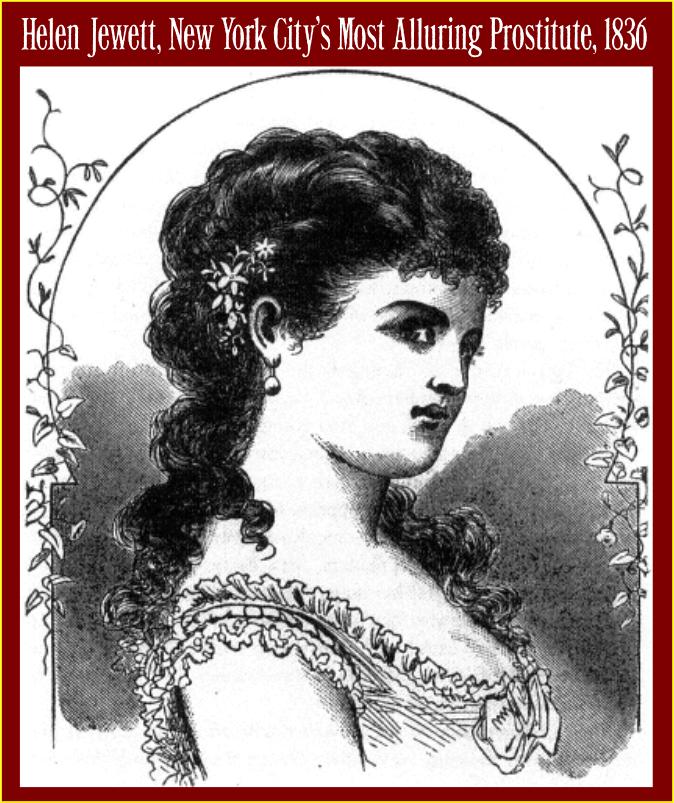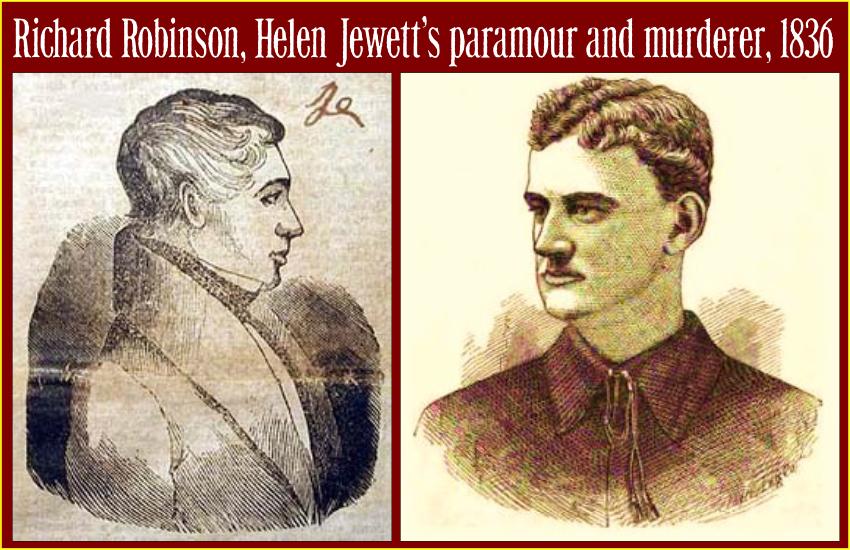The Sensational Murder of Helen Jewett, 1836
Story by Thomas Duke, 1910
“Celebrated Criminal Cases of America”
Part III: Cases East of The Pacific Coast
Doras Doyen, afterward known as Helen Jewett, was born in Augusta, Maine, in 1813. Her father died when she had reached her thirteenth year. Shortly afterward a prominent judge was attracted by the girl’s pretty face, remarkable aptitude for learning and sweet disposition, and as a result he adopted her and spared no expense in educating and providing her with every luxury. Two years later the girl’s beauty began to attract general attention, as did also some of her indiscretions.
When she reached the age of seventeen she and a young banker from Portland, Maine, were the principals in an escapade which created such a sensation that her guardian turned her from his home.
She proceeded to Portland, where the young banker provided her with a mansion of palatial splendor, where champagne suppers and midnight carousals were common occurrences.
But the pair soon quarreled and separated, the girl going to New York, where she assumed the name of Helen Jewett, and where her appearance attracted general attention as she promenaded the thoroughfares.
In describing her, Warden Sutton, in his history of New York City Tombs [jail] says :
“She was beautifully formed; had large black eyes which snapped with mischievousness, and one of the most fascinating faces that ever imperiled a susceptible observer.
“Her disposition was as beautiful as her face and figure and she was charitable to a fault with all who required assistance.”
Richard Robinson was born in Durham, Conn., in 1818, where he was carefully raised and educated by his esteemed parents. He developed into a large, handsome boy, and was always immaculate in appearance. He finally objected to being watched over by his parents and ran away from home to New York, where he procured employment in Joseph Hoxie’s dry goods store in Maiden Lane.
Being free from restraint the boy began to associate with evil companions and finally became a habitue of questionable resorts where he assumed the name of “Frank Rivers.”
One evening in 1834, when he was but seventeen years of age, Robinson was about to enter a theater when he observed a ruffian insulting a beautiful young woman, who was also en route to the same place of amusement.
The youth’s athletic physique enabled him to make short work of the hoodlum, which instantly made him a hero in the eyes of the young woman. She handed him a card and extended to him a pressing invitation to call on her at the conclusion of the performance. This card read, “Helen Jewett, Palais de la Duchesse Berri.”[1]
 Noting the girl’s attractive manners and appearance, Robinson gladly accepted the invitation, and when he arrived at the house he was ushered into the girl’s elegantly furnished apartment.
Noting the girl’s attractive manners and appearance, Robinson gladly accepted the invitation, and when he arrived at the house he was ushered into the girl’s elegantly furnished apartment.
Thereafter Robinson became a constant visitor and within a few weeks Helen’s passing fancy ripened into a mad infatuation. Finally, she began to fear that her handsome young lover was not devoting as much time to her as was possible and she concluded that she was receiving but a small share of his affections.
Determining to ascertain whether or not the suspicion was well founded, she disguised herself as a boy and followed him about town in the evenings. One night she saw him enter a house in Broome Street, and, gaining admission, she found him in the company of a rival siren. Like a tigress, Helen sprang upon the woman and struck her in the face repeatedly, her numerous diamond rings drawing blood with each blow.
This sudden and unexpected occurrence paralyzed Robinson for the moment, but when he recovered he restrained Helen from doing further violence. The unfortunate girl then became hysterical, but when she became calm she repented her actions and on her knees implored Robinson to forgive her. He turned a deaf ear to her pleadings, but several days later, after Helen had written numerous letters in which she begged for forgiveness, a reconciliation was effected.
As generally occurs in such cases, Robinson began to grow tired of the girl’s company, and he looked about for an excuse to discontinue the relationship entirely. He therefore decided to set a trap, and in a disguised hand wrote the following letter:
New York, July 7, 1835.
Dear Miss :
The author of the following epistle is a stranger to you, and common courtesy demands a perusal of his sentiments. I should have spoken freely what I here remark to your private ear, were it not I was of opinion you would suppose me guilty of trifling with your credulity and insulting your misfortune. I am not ignorant of your present mode of life and your degraded situation, and you will excuse the plainness of both the language and remarks. Acting with the impulse of nobler sentiments than those who have heretofore addressed you, I would present for your reflection the following proposal:
If the gifted and fascinating Helen will forsake the rough ‘road on which she has previously been a traveler, and adopt one more in unison with her enlightened mind, with no other security than her own word, he who now presents this petition will greet her, not as heretofore she has been, as a mistress, but as one whom the laws of the land bid him protect, cherish and love. I am sensible that the world would chide me for what they term folly, but the purity of my feelings, the genuine motives that inspire me, and the knowledge of your disposition and excellent qualifications that I have gleaned from the information of others, as well as my own observations, have instigated this request, which I solicit may be granted to your suitor, who respectfully subscribes himself,
Yours in esteem,
REUBEN JARVIS.
To Miss Helen Jewett,
No. 3 Franklin St., N. Y.
Helen believed that some admirer had written the letter in good faith, but her infatuation for Robinson was so great that she had no hesitation in forwarding the following:
New York, July 9, 1835.
Dear Sir :
It would be of little use for me to deny to a person who seems to know me as well as you do that an acceptance of your offer would be one of the most desirable things, as a social advantage, that my imagination could conceive. I do not attempt to conceal that it would; but, sir, I at the same time perceive that its acceptance would inevitably lead to the most unbounded actual misery to both of us hereafter. You could never substantially respect me, and, after the first season of your fancy, your fondness would give place to mistrust, and I would be suspected at a greater disadvantage than the numerous unblemished women who, notwithstanding the blamelessness of their early lives, are rendered miserable by the unfounded jealousy of their husbands every day.
Give me leave to speak, sir, on this subject as if I knew something of it. Woman is the bauble of man’s passions—always so when he has no deep respect for her purity of character or sentiment. You would be troubled with many unpleasant reflections after the first season of your liking was over, and the check which you would continually find me to your intercourse with society would first manufacture regrets and then turn them into hate. Knowing this from the experience which I have personally had of the evanescent ardor of mere passion, it would be unjust in me not to undeceive you, or not to reject a bond of ultimate misery for both. There are other reasons, less magnanimous than those which I stated, that induce me to respectfully refer your offer back to your reflections, but of those I need not speak. I find no fault with you for your frank estimation of the present degradation I am living under, but I am in a whirlpool from which I cannot rise by means of your proffer, and all I can do is to trim my bark to sail as decently as possible till I am eventually swallowed in its vortex.
For the compliments which you pay my qualities of heart and mind I feel grateful, of course ; but I commend you, if you are sincere, to think as little of them as possible hereafter. What destiny I am reserved for I do not know, but I do know that I cannot eke it out in the current you propose. If, therefore, you see me again—for I have no doubt that you have been acquainted with me more intimately than you pretend—maintain your incognito, and do not encourage yourself that an appeal in person, under any circumstances, will alter the resolution whicb I have here set down. That you may not hope that this determination was founded in caprice, I repeat there are circumstances of a private and selfish nature which, apart from any conclusion of philosophy, would oblige me to decide definitely against you.
Yours with respect,
H. J.
To Reuben Jarvis,
New York Postoffice.
Shortly after this incident, the pair had a serious quarrel, and Robinson left the girl and swore he would never return. Helen grew despondent and left New York, but returned in October, 1835.
By the merest chance, Robinson met her at the wharf, and after considerable pleading on her part, another reconciliation was effected.
At this time a woman named Rosina Townsend conducted a house of ill-repute at 41 Thomas Street, which was widely known because of the magnificence of its appointments. Helen became an inmate at this resort and Robinson, under the name of “Frank Rivers,” was a frequent caller.
A few months later Helen was informed that during her absence from New York, Robinson had impregnated a young girl, who subsequently died from poison alleged to have been administered by her betrayer.
Helen accused him of this crime, and although the accusation seemed to strike terror to his heart, he evidently convinced the trusting girl that he was innocent, and it was shortly afterward agreed that Helen should abandon her life of shame and the couple would become man and wife. She became very happy, but on April 10, 1836, she was told that Robinson had no intention of marrying her, as he was at that time engaged to a young lady of wealth and position. The girl became frantic, and immediately wrote to Robinson imploring him to come to her immediately and deny the charge.
She concluded the letter by saying: “You know how I have loved, but for God’s sake don’t compel me to show how I can hate.”
On the next day Robinson forwarded an unsigned letter, ‘ written in a disguised hand, in which he stated that he would call at 9 p. m. Saturday, April 11, and requested that she personally receive him at the door.
At the appointed hour Robinson, alias Frank Rivers, called, but the landlady chanced to be near the door and she admitted him. According to his usual custom, he wore a long Spanish cloak on this evening. Hearing his voice, Helen rushed out of the parlor and in the presence of the landlady embraced her lover and joyously exclaimed: “Oh, my dear Frank, how glad I am that you have come.”
The pair then retired to the girl’s apartments.
At one o’clock Sunday morning all of the inmates of the house had retired; the building was in darkness and all was silent as a grave.
Suddenly Marie Stevens, who occupied apartments on the second floor directly across the hall from Helen Jewett’s room, heard a noise, which sounded like a heavy blow being struck, which was immediately followed by a long moan.
She heard Helen’s door open gently, and then cautiously opening her own door, she observed a tall figure, wrapped in a long cloak and holding a dimly lighted lamp, glide through the hall.
The terror-stricken woman hastily closed her door and a few moments later loud knocking at the front door was heard. The landlady responded and admitted a male guest. She then noticed that a lamp was lighted in the parlor, which was a most unusual occurrence. She inspected the lamp and saw that it belonged to Helen Jewett. Her suspicions being aroused, the landlady began a tour of inspection. Finding the rear door ajar, she called out, “Who’s there,” but receiving no response she barricaded the door and proceeded to the next floor with Helen’s lamp. She knocked at the girl’s door, but hearing no answer, she opened the door and was immediately confronted by a dense volume of smoke which almost overpowered her. Her screams aroused the inmates of the house, who rushed to the room and extinguished the fire.
This room was filled with antique furniture, mirrors, valuable paintings and many rare books which had been presented to the beautiful Helen by her different admirers.
The scantily clad body of the unfortunate girl was lying on the bed ; her forehead having been split wide open by a powerful blow, evidently from a hatchet, and the upper portion of her body was burned brown by the fire.
The police were notified and the search for the assassin began. In the back yard of the premises was found a bloodstained hatchet which was subsequently identified as the property of Robinson’s employer, and near the hatchet was found the long cloak which Robinson habitually wore. The murderer was compelled to scale a whitewashed fence, and as he fled down the side street a black woman saw him, and while she could not recognize his features, she stated that his general physique was similar to Robinson’s.
The police went to the suspect’s room and found him in bed, where he claimed he had been for hours.
Upon examining his trousers, whitewash was found on one of the knees.
He protested his innocence but was arrested and taken to jail.
A few days later Frederick Gourgas, a clerk in Dr. Chabert’s apothecary shop, stated that Robinson, under the name of Douglass, attempted to purchase arsenic from him.
Relatives came to the prisoner’s assistance and employed able attorneys.
It was the theory of the prosecution that Robinson was determined to marry the young woman of wealth and position, but feared that if he did so, Helen would divulge what she had learned regarding the death of the young woman he had ruined.
He therefore determined to kill her with the hatchet which he had concealed under his cloak when Helen embraced him. The fact that he requested that she receive him at the door indicated that he wanted to enter the house unobserved by others, and he probably started the fire with the expectation that it would destroy the building and hide the evidence of his crime.
The trial was set for June 2, 1836.
In the meantime, the African-American woman, who observed the assassin as he ran away, mysteriously disappeared, and Marie Stevens, who saw him leave Helen’s room, was found dead in her bed. It was never definitely determined whether she committed suicide or was murdered.
But without these witnesses the testimony was overwhelmingly against the defendant.
The most important witness for the defense was one Robert Furlong, who conducted a grocery store at Cedar and Nassau Streets. He swore that Robinson was in his store the greater part of Saturday evening and did not leave until 10:15 p. m.
To the great surprise and disgust of all, except a certain class who lived from earnings of fallen women and regarded the defendant as a hero, the jury returned a verdict of not guilty.
It was openly chatted that members of the jury were corrupted and the court adjourned amid the wildest confusion.
After his acquittal, Robinson became extremely morose. He soon departed for Texas, where he died shortly afterward.
James Gordon Bennett, of the New York Herald, visited the scene of the murder and in the issue of April 13, 1836, said in part:
“This extraordinary murder has created a sensation in this city never before felt or known.
“This queen of the demimonde was the most beautiful of her degraded caste and had seduced by her beauty and blandishments more young men than any known in police records.”
[1] This place was a magnificently furnished resort conducted by one Madame Berri in Duane Street.
—###—



